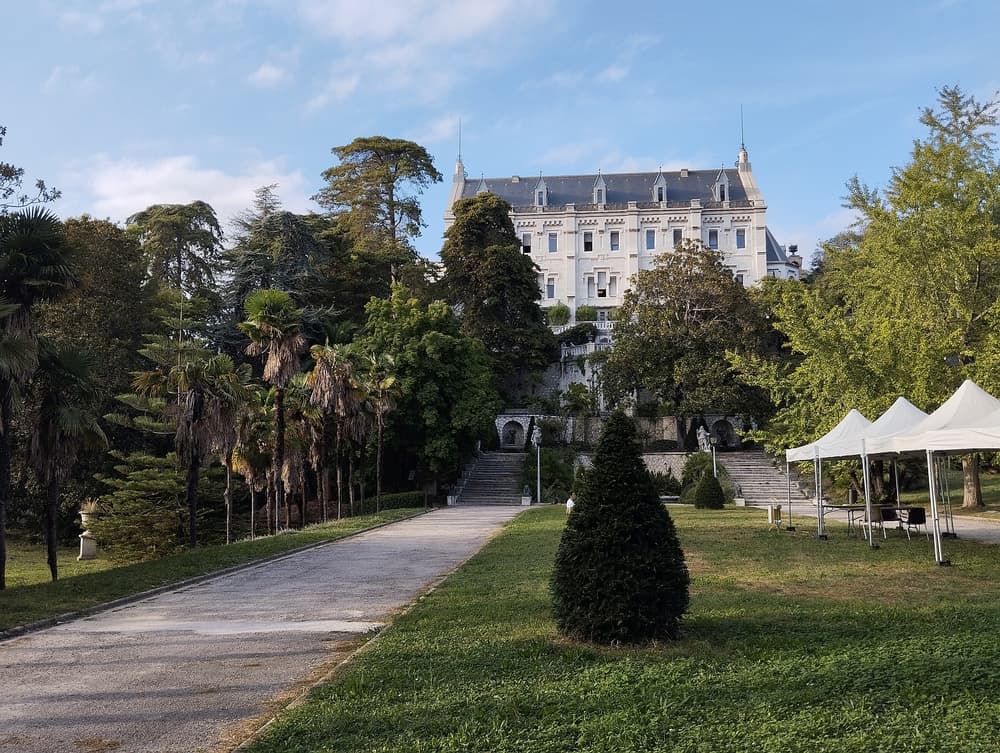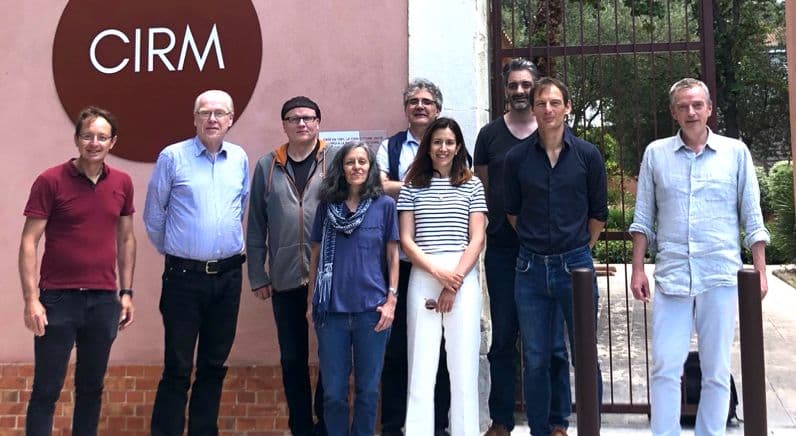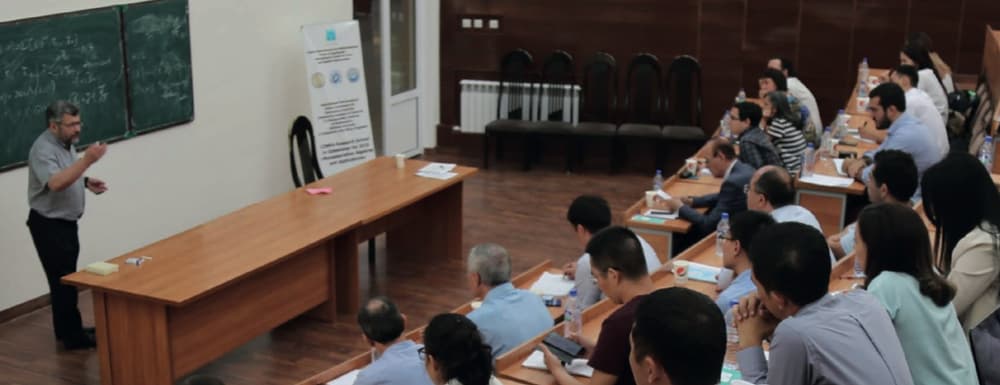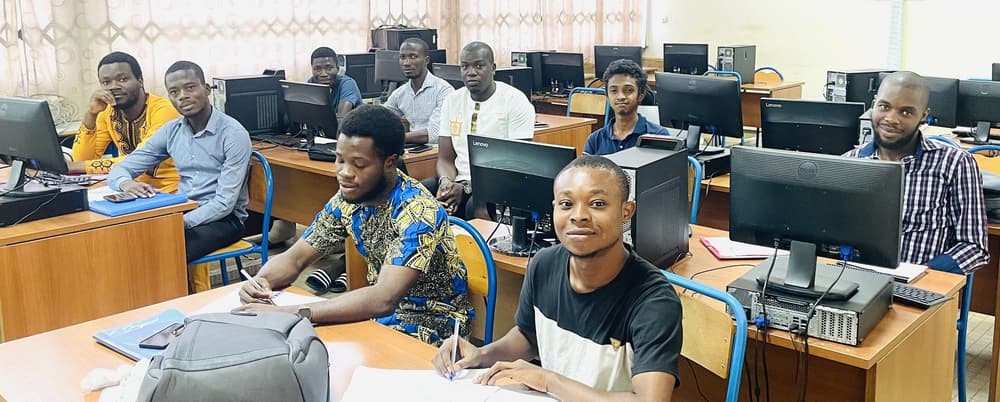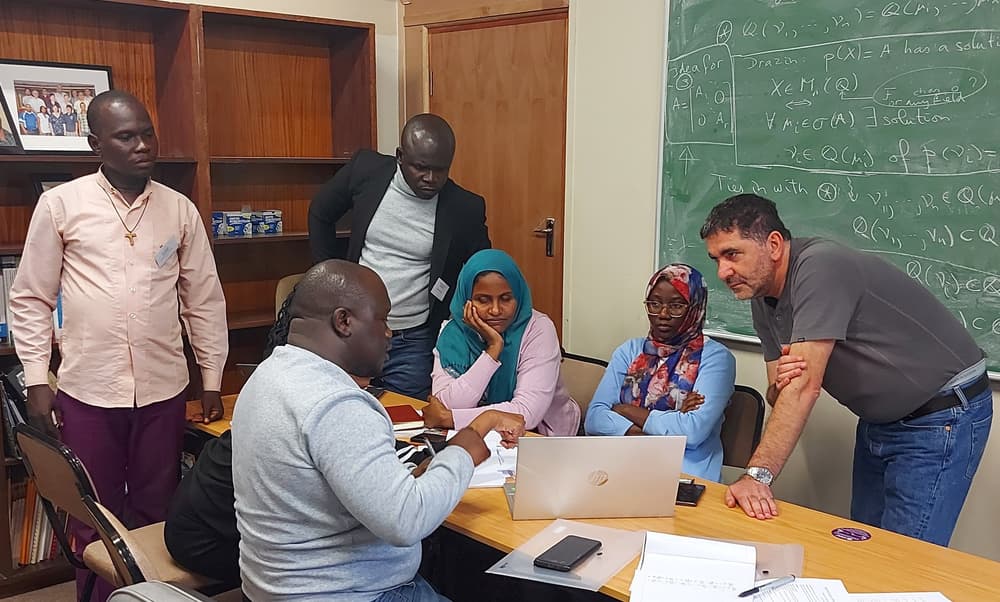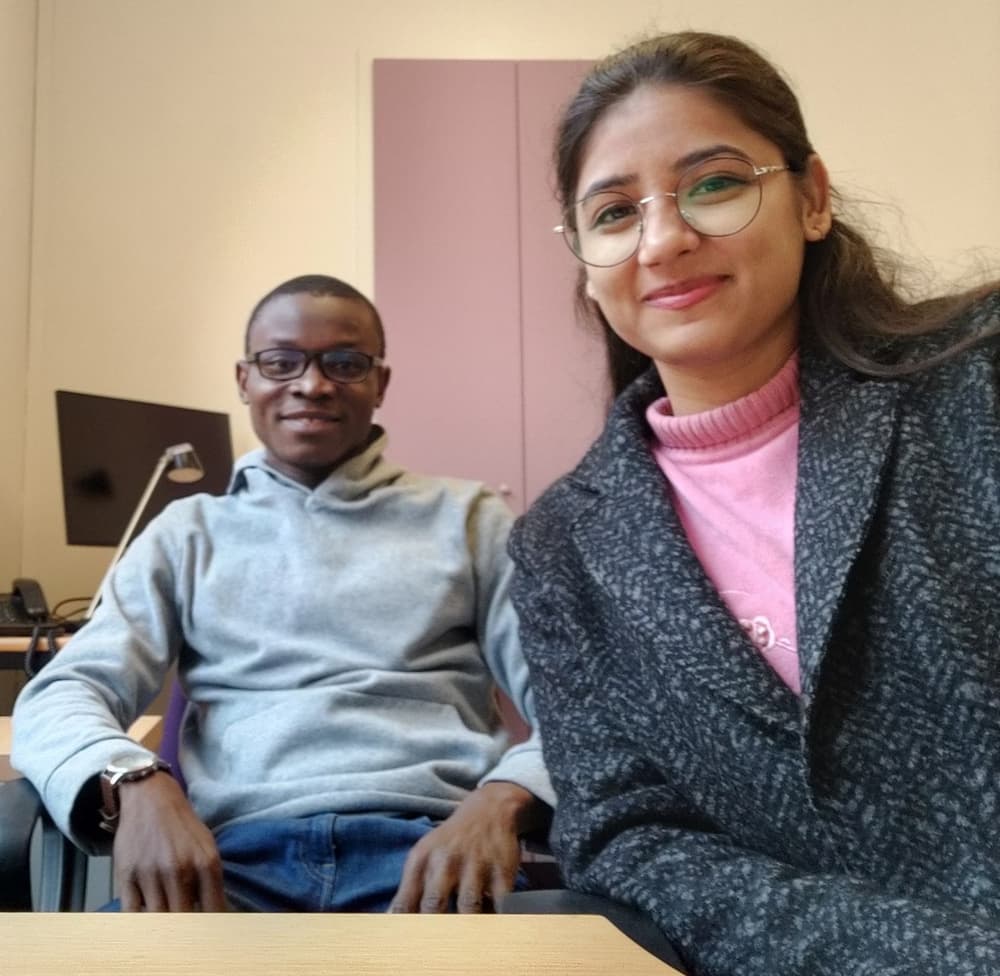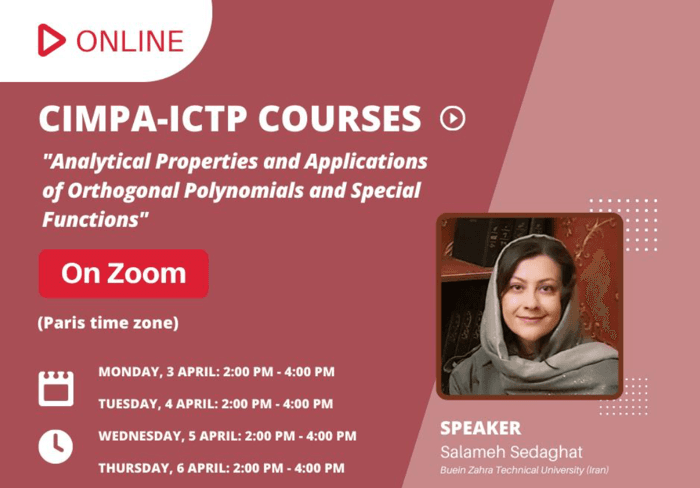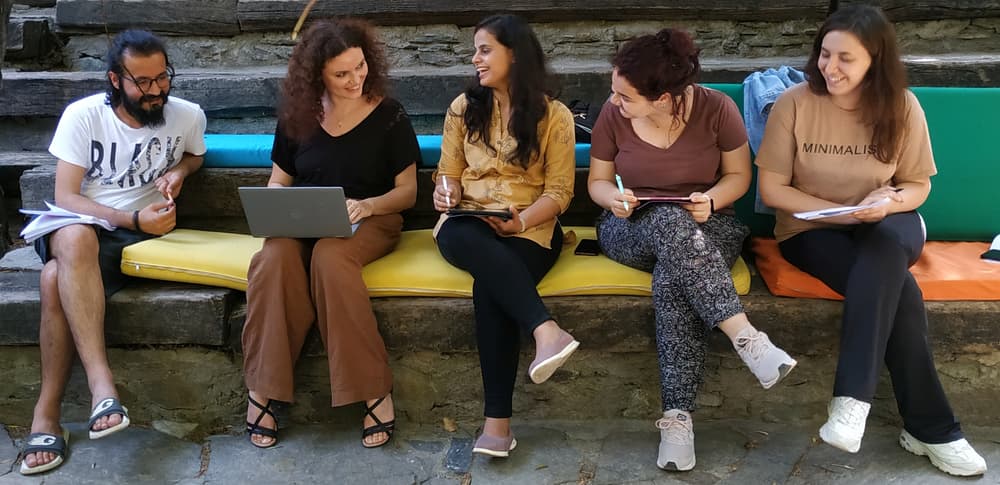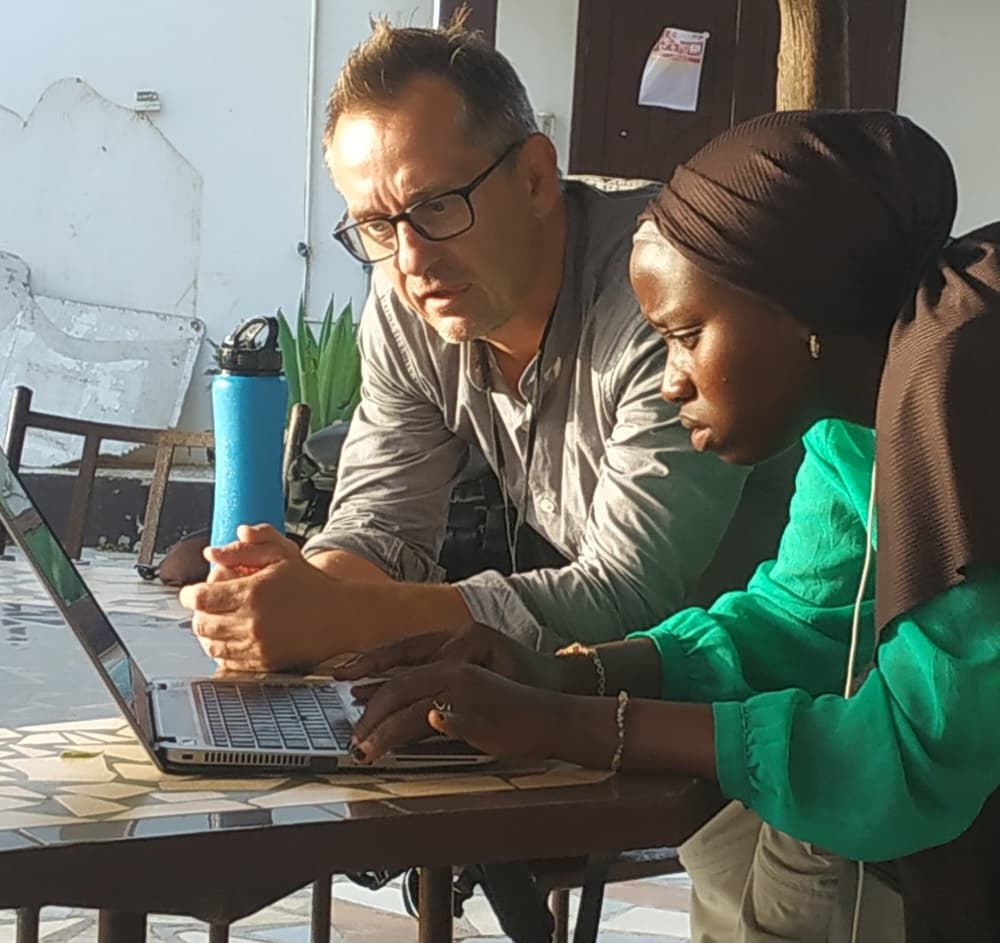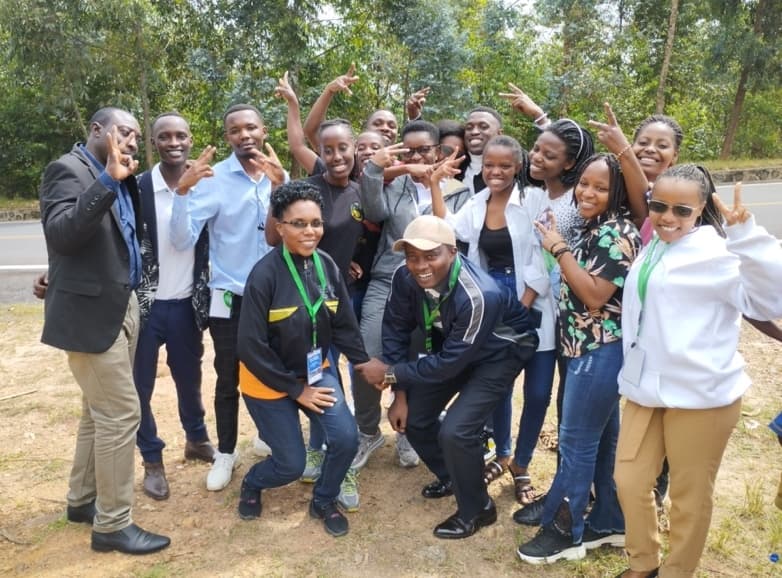Mathematicians feel part of a worldwide community: we share the same language; the concepts and tools are available anywhere and anybody willing to contribute to research is welcome. This idealistic statement must be confronted with the fact that research in the world is not homogeneously distributed: for instance, Africa, with 1/6 of the human population, has only 2.4% of the researchers and produces only 3.5% of the yearly scientific publications (90% of those in 12 countries, 25% in South Africa alone). CIMPA’s purpose is to help rebalance this situation.
What is CIMPA?
Campus Valrose of the Université Côte d’Azur, Nice
🅭🅯 CC BY 4.0The International Centre for Pure and Applied Mathematics (Centre International de Mathématiques Pures et Appliquées – CIMPA1https://www.cimpa.info) is a French association founded in 1978. Its mission is to promote international research in mathematics with developing countries. Based in Nice, on the campus of Université Côte d’Azur, CIMPA is a UNESCO category 2 centre and receives financial support from 5 member states: France, Germany, Spain, Norway, and Switzerland.
What does CIMPA really mean?
Most people believe that the CIMPA acronym was created with reference to the word “sympa” in French which means nice/friendly. Actually, the idea of CIMPA was launched during a UNESCO conference in Nairobi in 1976, and it comes from Swahili “simba,” the lion, apparently a reference to a famous French mathematician.
What is special about CIMPA?
Meeting in June 2023 at the Centre International de Rencontres Mathématiques with International Science Programme, EMS Committee for Developing Countries, IMU Committee for Developing Countries, London Mathematical Society and International Centre for Theoretical Physics (ICTP)
🅭🅯 CC BY 4.0As one of the main actors of the international cooperation in mathematics research with developing countries, CIMPA has several unique features and assets:
It is a strongly connected association that coordinates joint projects with major national and international stakeholders in mathematics.
It is run by and with mathematicians: collaborators and instructors are colleagues and work as volunteers. We understand their needs when preparing the calls and the events.
More than 40 years of experience has created trust and visibility. CIMPA’s management is known to be responsive and reliable, and our calls are sent through a monthly newsletter (subscribe!2https://www.cimpa.info/en/node/6012) with more than 10,000 subscribers.
An international independent Scientific Council3https://www.cimpa.info/en/scientific_council of mathematicians evaluates the scientific contents of applications and a Steering Committee4https://www.cimpa.info/en/steering_committee decides on the relevance of the events based on these evaluations.
We have proximity to the field thanks to our Scientific Officers,5https://www.cimpa.info/en/node/6191 who help the organisers of research schools during the application process and then during the school. Their presence at the events also allows them to develop new contacts and share opportunities with the participants.
CIMPA Scientific Officers
🅭🅯 CC BY 4.0What does CIMPA do?
Each year, CIMPA co-organises and finances several activities with developing countries on all continents. Each of these activities is subject to yearly calls for projects and applications in one of the following categories (more information can be found on our website6https://www.cimpa.info/en):
CIMPA Research Schools: these are organised by two coordinators, one from a member state, the other based in the developing country where the school will be held over two weeks for the benefit of participants from the region. Between 1997 and 2023, CIMPA organised more than 420 CIMPA schools7https://www.cimpa.info/en/node/36 in 73 countries. We insist on at least 30% female participation in the teaching team. These events give an international visibility to the host institute.
A CIMPA research school
🅭🅯 CC BY 4.0Schools in Partnership: CIMPA supports and helps to organise undergraduate- and graduate-level mathematics schools in partnership with continental and regional mathematical societies. These schools are mostly aimed at students from the country in which they take place. The calls for projects and selections are managed by committees with representatives of the African Mathematical Union, Unión Matemática de América Latina y el Caribe, the Southeast Asian Mathematical Society and the Asian and European Schools of Mathematics.
A CIMPA school in partnership with the African Mathematical Union
🅭🅯 CC BY 4.0CIMPA Courses: This programme consists of supporting the organisation of master’s- and research-level courses in developing countries. This scheme enables a fast and flexible response to a precise need in the academic syllabus, serves as preparation for or follow-up of another event, or provides long-term support to an emerging master’s programme. Since the introduction of this activity in early 2017, CIMPA has funded more than 110 CIMPA Courses.
A CIMPA course
🅭🅯 CC BY 4.0CIMPA Fellowships: Since 2017, the CIMPA fellowship programme has funded the participation of young mathematicians from developing countries in international thematic programmes (of at least a month) organised by partner research centres in France and in Spain. 73 mathematicians (34% of them women) have participated, with an average of 3 laureates per thematic programme. New programmes with Switzerland and Norway will start in 2024.
Two laureates at the Institut Henri Poincaré
🅭🅯 CC BY 4.0CIMPA–ICTP Research in Pairs: In 2021, CIMPA started a new programme, Research in Pairs,8https://www.cimpa.info/en/node/7159 which makes it possible for established colleagues based in a developing country to come to Europe to work with another researcher on a well-substantiated research project for a minimum period of 6 weeks. During her/his stay, the laureate will also broadcast/record a mini-course.9Some examples are available at https://www.youtube.com/@cimpamath7472/playlists. In 2022, ICTP joined the programme. In 3 competitive calls, 30 laureates (37% of them women) have been selected from more than 230 applicants.
🅭🅯 CC BY 4.0
CIMPA in Europe
Although CIMPA is a French association, in the last 15 years it has been progressively developing a European dimension, with the memberships of Spain (2009), Norway (2011), Switzerland (2011) and Germany (2021). Possible extensions with other countries are under discussion.
CIMPA also has close relations with several research centres:
Through the CIMPA fellowships programme: Institut Henri Poincaré (Paris, France), the Centre de Recerca Matemàtica (Barcelona, Spain), the Centre International de Rencontres Mathématiques (Marseille, France), SwissMAP (Les Diablerets, Switzerland), and the Lie–Størmer Center (Tromsø, Norway).
Through the CIMPA–ICTP Research in Pairs, since some research centres have agreed to welcome the laureates and their host for a week in their premises: the Centre de Recerca Matemàtica (Barcelona, Spain), the Centre International de Rencontres Mathématiques (Marseille, France), Forschungsinstitut für Mathematik (Zürich, Switzerland), and Mathematisches Forschungsinstitut Oberwolfach (Oberwolfach, Germany).
Research group during a CIMPA school at the Nesin Village
🅭🅯 CC BY 4.0What is the future of CIMPA?
The world is changing at a fast pace, and it is hard to predict how it will evolve, with many threats to its future. What we observe:
Security issues, prices of airline tickets and carbon footprint impact make it less easy to organise our meetings. However, our partners always take great care to receive us with the greatest hospitality and attention. Although it is important to reduce our carbon impact globally, it would be sad to cut collaborations with the countries which pollute the least and have not yet benefitted from international collaborations.
The pandemic has revealed and improved the possibilities for online collaborations. It has also shown the current limitations, and so one must find a synergy between online and in-person activities. At CIMPA, we believe in encouraging collaborative activities as they maximise the benefit of human interactions and are difficult to do online.
It will be important to reinforce South-South collaborations by creating structures located in developing countries along with new tools to help our colleagues find time to develop their research. CIMPA is not large enough to do this alone, but will strengthen its coordination with other agencies to work in this direction.
Group picture during a school in partnership in Rwanda
🅭🅯 CC BY 4.0How can you contribute?
Participate in a CIMPA school: although participants from developing countries are the main audience and are the only ones who can be supported financially by CIMPA, it is good for young participants from these countries to meet other young participants from Europe and build connections.10You can find the list of schools for 2024 at https://www.cimpa.info/en/schools_list_with_map/2024.
Stay in touch through our networks (newsletter,11https://www.cimpa.info/en/node/6012 CIMPA on Facebook12https://www.facebook.com/people/CIMPA-Centre-International-de-Mathématiques-Pures-et-Appliquées/100069451794798 or CIMPA friends).
Advertise our activities among your professors or colleagues.
Become an instructor or an organiser of an activity. Our calls for events are not like ERC calls: all applications that have been prepared with care are usually selected and CIMPA’s Scientific Officers are here to help you through the application process.
- 1
- 2
- 3
- 4
- 5
- 6
- 7
- 8
- 9
Some examples are available at https://www.youtube.com/@cimpamath7472/playlists.
- 10
You can find the list of schools for 2024 at https://www.cimpa.info/en/schools_list_with_map/2024.
- 11
- 12
Cite this article
Christophe Ritzenthaler, Expanding our horizons: Research with developing countries. Eur. Math. Soc. Mag. 131 (2024), pp. 32–35
DOI 10.4171/MAG/166
